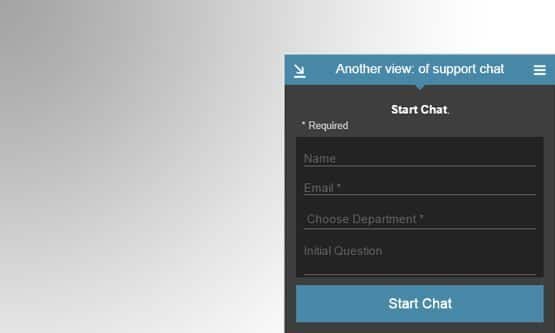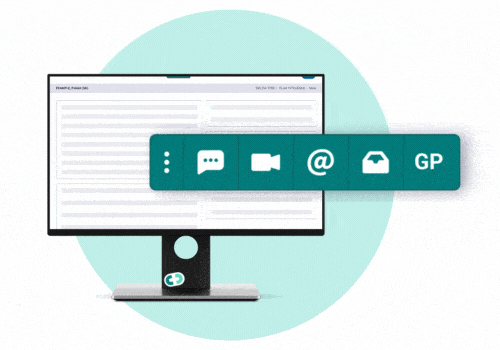Another view: of support chat

A problem all companies face is how to deal with existing customers. They already have their money, so they aren’t going to get much more from them.
This makes it difficult to justify huge workforces to support them and get them the kind of instant response that they get initially from the sales team.
But annoy too many of them, and you get a bad reputation. Customers leave or you fail to get new sales. So the cynic in me says most companies do the bare minimum that they can get away with to support existing customers with problems.
Tools for the job
At the same time, companies use a range of tools to handle people in this situation. There’s the queuing phone system – ‘press one for sales’, and so on and so on.
Presumably, it is deemed better to keep someone in a queue – and to let them know where they are in that queue – than have them get the engaged tone or to be left on hold with no idea about the competition they are up against for an answer.
Sometimes, the phone system may direct people to the right department; speeding their journey. Some companies also use the dead time to advertise their products and services.
A company may also have a website with a support section and a FAQs page. This may try to point out the obvious at little cost or get people to contact the right person, since triage can be expensive in itself.
Now, it’s fairly obvious that what a GP practice does is broadly similar to what a support team does. We aren’t paid by transaction, but by registered list. So each time a patient contacts us it’s a cost we could do without.
I get the feeling some practices address this by adopting a similar mentality to the poorer companies when it comes to support; they put the least amount of resource into dealing with ‘customers’ that they find it possible to get away with.
However, practices could learn a lot from the real world. My practice has a queuing phone system and we spent ages thinking about the flow of calls – the most often requested option is on ‘press one’ to get people to it as quickly as possible.
My practice also has a FAQs section on its website. It would also be nice if our phone system could tell people about it, rather than playing an annoying tune.
The pros and cons of “doctor first”
With ever increasing demand, I've been thinking about what else could be done. A lot of practices are trying “doctor first”.
In this system, a doctor rings a patient back and tries to deal with their problem there and then. The doctor only offers an appointment to the few patients who need an examination.
This differs from having calls handled by a receptionist in that some patients don’t like talking to the receptionist.
Also, not being medically trained, the receptionist might get the priority wrong – and there’s no doubt the ‘Chinese whispers’ thing can happen. Sometimes, by the time I get a message, it makes no sense – or I have a follow up question, and then getting hold of the patient can be a problem.
I have some friends who swear by “doctor first”. Equally, I've a couple of other friends who have been doing it a while now and hate it.
The concept is that not every contact needs an appointment. The downside is that the list to ring back can be huge and, as the caller, you are the one who can be left hanging on the phone.
Online chat
Twice in the last week I've used online chat to get support from companies I've been dealing with; and I wonder if this could be the next big thing.
The first time I found myself using the service was with my practice’s local IT support. This was odd as I didn’t see what benefit it had over a call.
But the second experience was with Nectar and it worked well. I was on their FAQs page. I couldn’t find anything that met my query and I clicked on the ‘chat with a representative’ box, confirming I’d read all the FAQs.
Up popped a box. I filled in my customer details and clicked ‘next’. After a short wait, I was directed to another box with a greeting from an assistant. After that, I just typed in my query to ‘chat’ to them.
This got me thinking. I’ve also just read yet another article going on about Skyping patients. I’m very dubious about Skype from the whole ‘how do you add it to the workflow of appointments?’ point of view.
Would online chat be a better way to help us deal with our patients? We have up to 17 doctors at our place. If we all had our chat clients open during morning surgery, we could answer between patients or in pre-determined slots.
If we could guarantee that patients had first done all the usual stuff – like been offered online appointments, prescriptions and so on – would this work for us?
If it directed the patient to their usual doctor where possible, showed their records, recorded the conversation in the notes; I can see it having a role.
It’s the live bit that appeals
It’s the live nature that appeals to me. One of my patients, with whom I have become friends over the years, emailed me the other day about a repeat of the medication we are trying him on.
Fair enough; but I was sitting in a conference in Manchester; so I had to reply and apologise. If this happened all the time I’d lose the emails in the 100+ I get a day already.
A mix of a secure online/offline messaging system might be interesting. I wonder if there are any other tricks or techniques we can learn?


Dr Neil Paul
Dr Neil Paul is a full time partner at Sandbach GPs; a large (22,000 patient) practice in semi-rural Cheshire. He is also one of the directors of 4GPs Ltd. Dr Paul has been involved in primary care IT and health service management for more than ten years in various roles, including PEC member and urgent care lead. In his spare time, he writes medical iPhone software and is a keen photographer.




